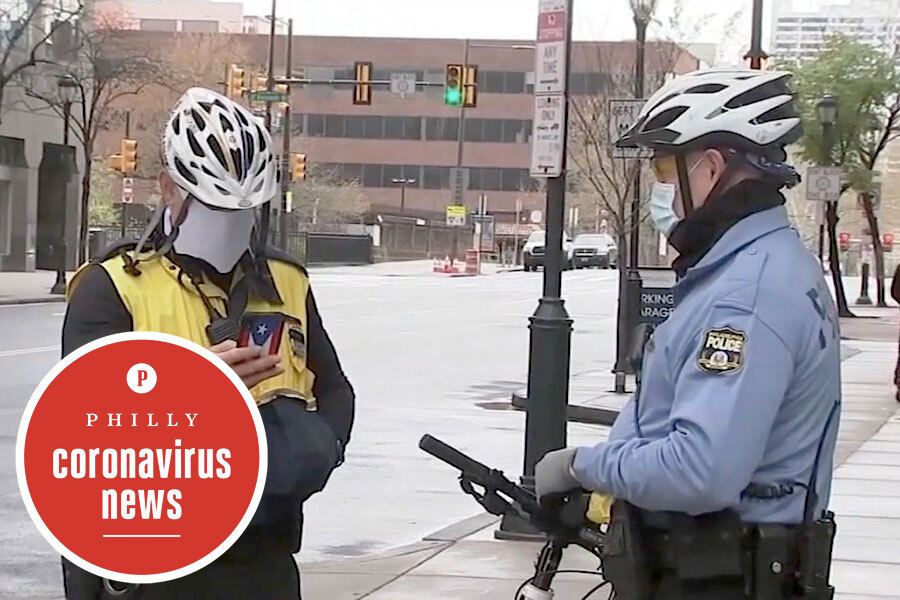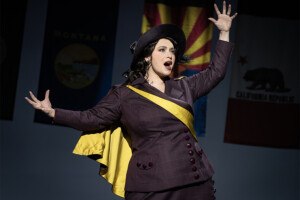Philly Coronavirus News: It Sounds Like Police Haven’t Handed Out a Single Ticket to Stay-at-Home Violators
But maybe they're on to something.

Philly police during the coronavirus crisis. (Image courtesy 6 ABC).
A roundup of Philly coronavirus news.
Philly Police Pretty Sure They Haven’t Handed Out Any Tickets to Stay-at-Home Violators
On Monday, we told you about the crowds of people that had converged on Rittenhouse Square over the weekend — unmasked, un-distanced, and apparently generally unconcerned about the coronavirus. And since then, we’ve heard from more than a few readers telling us about similar crowds that had assembled in other areas of the city. According to the Philly’s 311 records, residents have been complaining to the city about such gatherings.
Since simply hanging out in a park (or on the corner, or on your neighbor’s front lawn, etc.) is a clear violation of Philly’s stay-at-home order, we were curious how many citations police had issued to stay-at-home violators. And it sounds like the answer may be zero.
Philly police don’t keep clear records of the citations — or Code Violation Notices (CVNs) — related to the coronavirus restrictions that are in place. But a spokesperson for the Philadelphia Police Department sounded pretty sure that police haven’t handed out any CVNs to stay-at-home violators.
“Generally, we are not aware of any CVNs that have been issued to date related to COVID-19 restrictions,” the spokesperson told us. “Verbal warnings from police have been effective so far. We will continue to encourage people to disperse using these verbal warnings, and hope fines will not be needed.”
Earlier this month, 6 ABC asked new Philly police commissioner Danielle Outlaw about her approach to policing gatherings in Philly amid concerns that officers might get the coronavirus from members of the public.
“Do we really want to inject ourselves in a situation or do we need to inject ourselves in a situation that could make things worse altogether?” Outlaw told 6 ABC.
22 People Have Been Charged in NJ With Terroristic Threats Related to the Coronavirus
Maybe the Philadelphia Police Department is actually on to something here.
In New Jersey, at least 22 people have been charged with “second-degree terroristic threats during an emergency” for allegedly claiming to have the coronavirus and then spitting, coughing or otherwise threatening to expose law enforcement officers or others to the coronavirus. If convicted, they face five to ten years in prison and a fine of up to $150,000.
Speaking of New Jersey, more than 1,900 people have been charged with violating Governor Phil Murphy’s stay-at-home order. The state posts their names to a wall-of-shame on a daily basis. While a violation in Philly has a mere $100 fine attached to it, in New Jersey, it can get you up to six months in jail and a fine of $1,000.
MilkBoy Files Class-Action Lawsuit Over Insurance Coverage
We’ve already seen South Philly BYOB River Twice and Comcast Center steakhouse Chops file federal lawsuits against their insurance companies over coronavirus losses. But in both of those cases, the restaurants filed the lawsuits on behalf of themselves only.
Now, Philly bar-restaurant-music venue MilkBoy has filed a class-action suit against its insurance company on behalf of itself and any other bars, restaurants or other businesses that have a policy with that company. The company in question is Cincinnati Insurance. So if you own a business that has a policy with Cincinnati Insurance and you’re experiencing losses due to coronavirus (and who isn’t?), you might want to get in touch with MilkBoy and join the suit.
Comcast Extends Freebies During Coronavirus Crisis
Comcast just announced that the company is extending its coronavirus response policies through June 30th. This includes all of the following: free Xfinity wifi for everybody via the company’s many hotspots; unlimited data for any customer with an Xfinity data plan; and free in-home broadband access for 60 days for any qualifying low-income household. Plus, if you can’t pay your Comcast bill, you can let the company know and they’ll waive any late fees and won’t disconnect you… for now.


